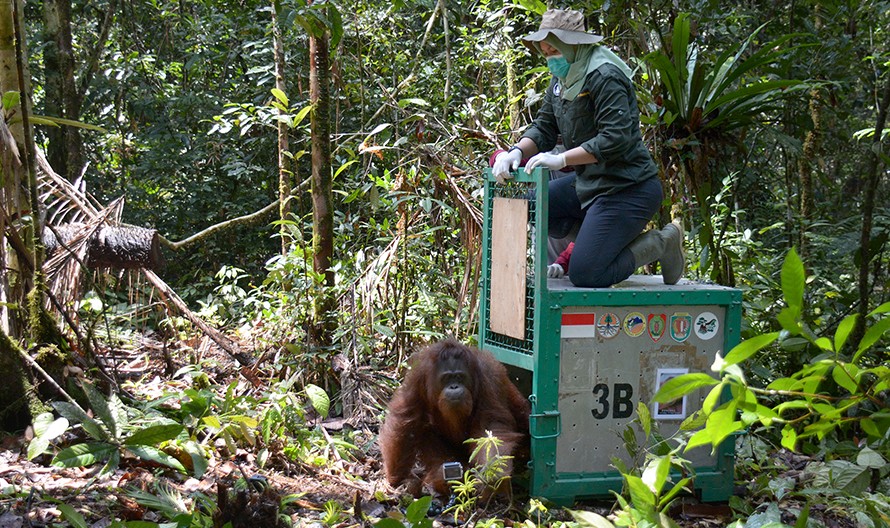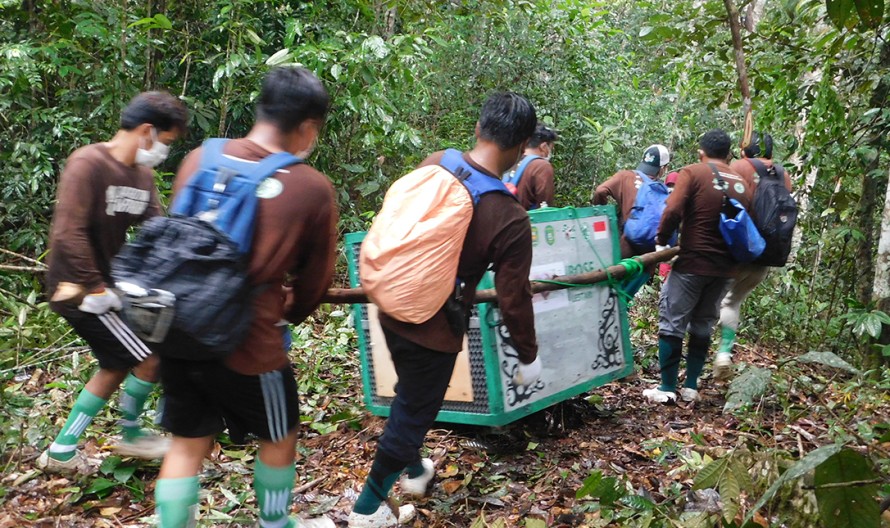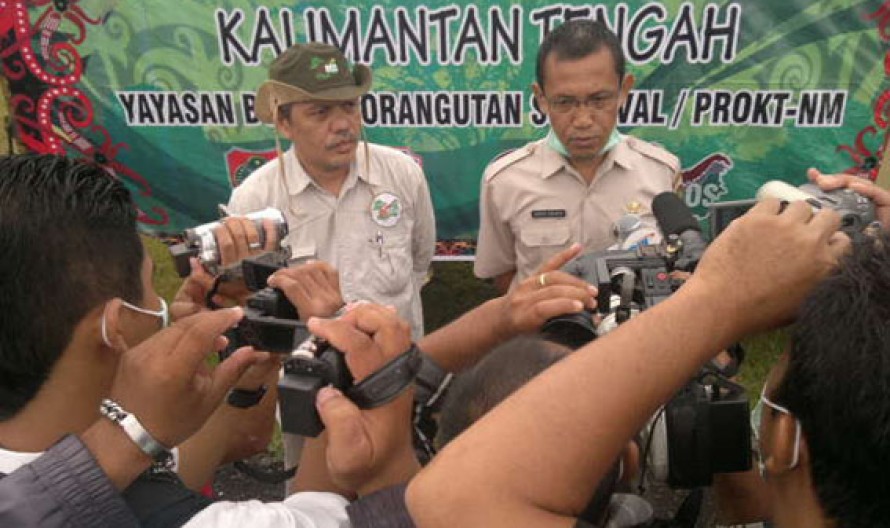Palangka Raya, Central Kalimantan, 14 June 2023. In commemoration of Earth Day, the Central Kalimantan Natural Resources Conservation Agency (BKSDA), the Bukit Baka Bukit Raya National Park (TNBBBR) Agency, the Borneo Orangutan Survival (BOS) Foundation, and other parties are releasing ten more rehabilitated orangutans into the forest of TNBBBR, specifically in Region II under the National Park Management Office in Kasongan. Before being released into the forest of TNBBBR, the ten orangutans, consisting of two males and eight females, underwent rehabilitation at the Nyaru Menteng Orangutan Rehabilitation Centre in Central Kalimantan. This release activity also saw the inauguration of the new orangutan monitoring camp in the Hiran watershed. The camp was given the name “Himba Pambelum,” which means “Forest of Life” in local Dayak language.
Ten orangutans from the BOS Foundation’s Nyaru Menteng Orangutan Rehabilitation Centre will be transported to TNBBBR in Katingan Regency in two staggered trips to separate release locations. The first trip will take four orangutans to the forest in the Hiran watershed on June 14 and the second trip will bring six orangutans to the forest in the Bemban watershed on June 16, 2023.
Head of the Central Kalimantan BKSDA, Sadtata Noor Adirahmanta, S.Hut., M.T., said that efforts to conserve wild animals are facing greater challenges than ever before, so all stakeholders need to work together.
“The government is committed to preserving Indonesia’s biodiversity through systematic conservation efforts and the sustainable use of natural resources, ensuring the health of natural ecosystems and the preservation of the vast biodiversity they contain. One of the efforts to preserve biodiversity is through the reintroduction of rehabilitated wildlife, especially orangutans, into their natural habitat. Orangutans are one of the flagship species that continue to be a priority for the Ministry of Environment and Forestry. Through various conservation efforts, we are working to maintain their presence in their natural habitat and create healthy and growing wild orangutan populations. By increasing public understanding regarding the importance of this protected and endemic species and by protecting their habitat, we hope that the integrity of these forest ecosystems will be maintained,” he said.
According to the Head of the Bukit Baka Bukit Raya National Park (TNBBBR), Andi Muhammad Kadhafi, S.Hut., M.Sc., reintroduction is a long process that starts from rescuing animals and is followed by rehabilitation, release, and monitoring to ensure that these reintroduced individuals can live and breed in their habitats. To support these effort, we also joined the inauguration of the new orangutan monitoring camp in the Hiran watershed of Region II under the National Park Management Office in Kasongan, Central Kalimantan. With the new monitoring camp, we hope that in the future, the release process will run smoother as it is finally supported by improved facilities and infrastructure.
“The utilisation of the Hiran and Bemban watersheds as an orangutan release area since 2016 is our way of optimising the distribution of released orangutans here in the national park. The persistence of the wild orangutan population is an important indicator of good forest conditions, not only for orangutans but also for other animals. These collaborative efforts have helped to create independent and sustainable wild orangutan populations. Seven natural births have been recorded in TNBBBR since orangutans were released for the first time here in 2016. Additionally, community involvement surrounding the release site is expected to increase public awareness to help conserve orangutans and their habitat in this national park,” he added.
Since 2016, the TNBBBR Authority, the Central Kalimantan BKSDA, and the BOS Foundation have worked in collaboration to see the release of 189 orangutans. With the release of these ten individuals, a total of 199 orangutans have been released in the area.
Dr. Ir. Jamartin Sihite, MSc., CEO of the BOS Foundation, said, “The release of these ten orangutans is the second release to be carried out by the BOS Foundation in 2023. Currently, there are around 400 orangutans being rehabilitated by the BOS Foundation, many of whom are ready to live freely in the forest. However, the responsibility for protecting and conserving orangutans is not only that of the BOS Foundation and the BKSDA, but a joint effort that requires all parties and stakeholders to work together. As humans we all reap the benefits of healthy forest ecosystems, but for these ecosystems to thrive, they need the presence of orangutans. In return for their protection, these forests provide us with fresh air, clean water, and a regulated climate.”











